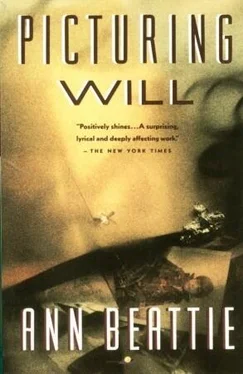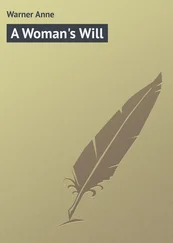With a sense of pride, Corky imagined herself to be the most responsible adult Will encountered. She had never met Jody, but from the way Wayne presented her, she was one of those attractive, insulated women who waited until life came knocking on their door, and who had a sorceress’s power to see that it would. Apparently, she had had no interest in Wayne’s carpentry and thought that a college education was the only respectable way to go. Wayne said it was Jody’s fault that he lacked self-confidence; he had wasted precious years in exile because she wanted to live in the country, and commuting into the city became more of a hassle than it was worth. She already had a degree; he was supposed to work all day in solitude and then drive for miles to night classes in Washington and come home and do all the work in his spare time, which was never spare time because he was always on call as a handyman. Then she got pregnant — on purpose, he suspected — and insisted on having the baby, although the timing was bad and their relationship was already shaky. Corky could understand Jody’s position, though — others could do what they wanted, but Corky personally felt that abortion was a sin — yet she did not argue with Wayne. Instead, she tried to persuade him that the time was perfect for them to have a baby, that he shouldn’t generalize from one bad experience. Yesterday morning she had put a booklet about amniocentesis on the bedside table, and earlier in the week she had asked Corinne not to tell Wayne that Eddie had fainted moments before they performed a cesarean; she was pretty sure Eddie wouldn’t tell an embarrassing story about himself. Why tell someone like Wayne every plan, express every misgiving?
It did seem clear to Corky that if she hadn’t married Wayne, she would have left Florida by now. She missed the seasons in the North. She didn’t like tourists. She felt — though this was impossible to articulate, even in letters to her sister — that living in a place where the sunsets were so intense, she didn’t have a future. That the sun had a future, but she didn’t, and that hers was a life of little consequence. The sunsets were like the last lines of novels that let you know a sequel was planned, and that made her all the more uncertain — in spite of her hopes for a long, happy marriage to Wayne and her desire to have a child — about what would really happen to her. Sometimes, on the weekend, she would go to the pier with Wayne, and while he studied the sinking sun she would be thinking not that what she saw was romantic, but that the colors — the ever-deepening silver streaks and shades of pink and lavender — were exhausting in some way.
She always said yes reflexively when Wayne said the sunset was beautiful. There was no reason for him to know that she was avoiding looking at it, or that evening, so exhilarating for most people, made her sad because the enormousness of the sky made it clear that she was only a speck, a mortal speck, and that everything might end before she had what she wanted.
That day, feeling worn out, Corky had gone to her boss’s doctor for a shot of vitamin B12. The doctor asked no questions and the nurse asked her for fifteen dollars in cash as she was leaving. As far as Corky could tell, the shot really had been a pick-me-up. Why else would she be up when Wayne was asleep, turning over so many things in her mind? Photos of three grinning towheads had been framed above the doctor’s desk. Like archangels, they had hovered above his head as he wrote a prescription for Ativan, in case Corky had trouble sleeping. Except for taking medicine for menstrual cramps, Corky never took pills. Corky went into the kitchen, took the bottle out of her purse, and placed one of the tiny white pills on her tongue, establishing a bond with her employer, who took the pills throughout the day, not just to help her sleep. Marian said that Corky was her best employee, and that soon she wanted to start training her as a buyer. Of course, it was understood that if Corky got pregnant, taking care of herself would take precedence over anything Marian might have in mind.
Corky picked up a few more things, looked in the cupboard to make sure the sheets for the fold-out bed hadn’t started to smell musty since they were last in use. Wayne would never think to check something like that, but it was important because children hated funny smells, and Will would have enough problems adjusting, coming from the cold winter weather into the humidity and sun. But of course, she thought, as she opened the closet door, that would be a nice thing for a child, coming from gray days into a sunny world; it was like being born. Why couldn’t she be Will’s mother? Why was Jody blessed with motherhood, with Wayne’s child, when her home and Wayne’s was childless? Why did she try to convince herself that everything was for the best?
Tears welled up in her eyes. The sheets smelled of mildew. The mattress she and her mother had tried to move years ago smelled the same way. Corky could remember feeling infinitesimal next to the mattress, and smaller still as one of the cops hoisted it and helped her mother carry it back into the house, saying, “Lady, I’m just real glad it’s not a body.”
She knew very little about Wayne’s childhood, and he knew very little about hers. She liked it that Wayne didn’t want to pry into her past — an unusual attitude for a man, in her experience. What men always wanted to do was banish the other people — cap the lid on their existence, like placing one checker on top of another. Men wanted to make other men — of course men didn’t care about your childhood friends, only about other men — into understandable clichés and then dismiss them, pick them up and take them off the board. You could help them by mentioning only the nasty one-liners, remembering only rainy days, producing a picture of the person in which the former beloved foolishly held up a fish not big enough to brag about, or one in which he was flanked by his friends, who had previously been described as villains. Wayne had surprised her, though, by not being curious. It made her wonder what he might have done that he didn’t want her to inquire about. How bad had things been, that he would rather not mention those people, or those years? Sometimes she felt that he was too handsome to be interested in her, that she had gotten lucky too fast. They had met at a garage sale when he stopped to look at hubcaps and she was flipping through a twenty-five-cent National Geographic . Instead of buying the magazine, she bought a book of Sherlock Holmes stories — she still had the book and hadn’t read it, but meant to one day — and he bought a hubcap and a frying pan. She figured that he was a single man because of that purchase: No married man picks up a frying pan at a garage sale. They had glanced at each other as they paid for their purchases. Walking toward their cars, she had sneaked another look, and later he confessed that he had walked slower than usual so that he could more or less keep pace with her. His car was parked in front of hers. As she was opening her car door, he had hollered something that she didn’t quite understand. She looked at him quizzically and heard him the second time: He had National Geographics in the trunk of the car, and they were hers, if she wanted them. She walked toward him, feeling the hot-faced shyness she had experienced as a little girl. He smiled and opened his trunk. There were six National Geographics he said had been in the trunk when he bought the car. There had also been newspapers tied with string, he told her, and a couple of cinder blocks — none of which were there when she looked in — and he smiled when he told her it was only some time after buying the car that he had figured out the previous owner must have put them there to stop the car from fishtailing. Then suddenly he was telling her how much faster the car guzzled gas if a bag of sand was in the trunk, and she was complaining about the battery she had bought that went dead one month after the warranty expired. While other people had a book of matches or a drink stirrer or some other little souvenir of the night they met, Corky had a pile of National Geographics . She would have to put them in the closet so Will didn’t think they were something he could play with. As silly as it might be, she did feel a great sentimental attachment to them. When she looked at them that first time, flipping through nervously as she and Wayne had coffee, she had felt elated, as if the African tribesmen and egrets on the wing foretold their exciting future together. If Will’s round-tipped scissors had begun to cut anything out of the magazines, it would have been like cutting out her heart.
Читать дальше












